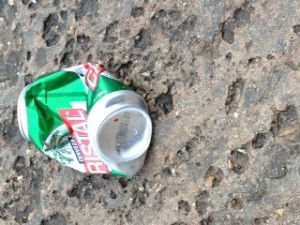
A man dressed like a mechanic pours liquid from a tank into the sewer. A few yards away, two boys are scrubbing a motorcycle and the soapy water runs off onto the ground, watering the roots of some nearby trees. Several neighbors have set fire to a pile of trash: dry leaves, branches, but also a couple of batteries, a portable radio and even a laser printer cartridge. After re-using it a dozen times, the restaurant cook pours the burned oil down the sink, that is if he doesn’t take it home for his family to eat. The hairdresser upstairs does the same thing, when she tosses the used hair dye down the toilet. This irresponsibility in the treatment of waste products extends across the entire Island. Few are aware of the ecological damage caused by ordinary daily activities.
Separating trash such as cardboard and glass, which is natural to others, seems like a chimera in a country that hasn’t even solved the problem of efficient trash collection. Even today the containers on the corners overflow, bringing the flies, health hazards and stink that now make up an inseparable part of cities like Havana. Thus, it’s hard work to awaken awareness in a population whose priorities still center on the so-called community services working at all. However, much of the damage that we are causing to the environment is irreversible, and requires urgent measures to slow it down as quickly as possible.
The State sector is the greatest predator of our ecosystem, with its enormous factories that spew chemicals into rivers and the oceans, its many sugar plants without oxidation ponds, and its thousands of vehicles that don’t meet environmental standards. In addition, all this is hidden by the absence of transparency, the falsification of statistics and the prohibition on independent organizations that could address such behaviors. Nevertheless, we as citizens also have to share a good part of the blame.
The lack of an environmental mindset is felt in every detail of our lives. It’s notable, for example, the self-confidence with which so many Cubans cut down a tree, cement over their backyard where plants used to grow, throw chemical products into the water, mistreat and kill animals, or simply toss out recyclable materials. It’s not enough to ask children in elementary school to plant a bean seed to foster in them a love of nature. It’s also not enough to show ads on prime time TV calling on us to preserve the planet on which we live. Caring for the environment has to become a part of educational programs, strictly addressed in the law, and promoted in all areas.
The emerging civil society should also adopt this banner. Without lowering the torch of human rights and democratic changes, it’s time for civic movements to create environmental defense strategies for this Island we will bequeath to our children. Groups that report incidents against the ecosystem, organize recycling training programs, and try to protect natural resources should all take on a leading role. It’s great that we want the coming generations to be free, but we must start by guaranteeing we have a country to bequeath to them.
The clock is ticking. Nature does not wait. Tomorrow there will be no turning back.
The post ¿Cuidamos el medio ambiente en Cuba? appeared first on Generación Y – Yoani Sánchez.
24 November 2013
